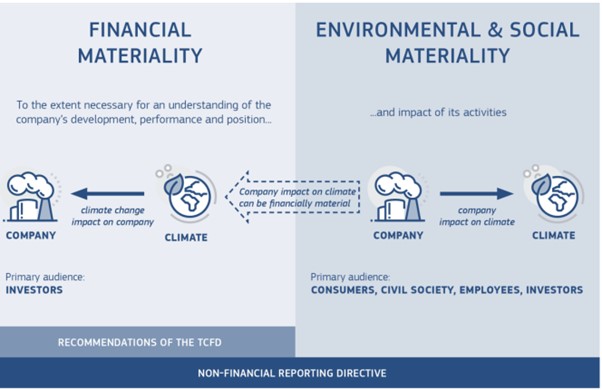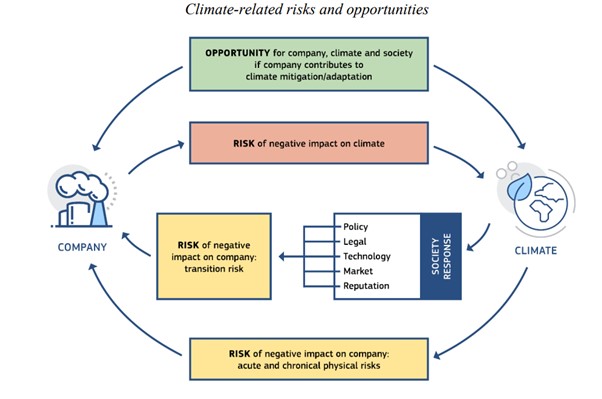Health care and life science organizations have always prioritized saving lives and now extend that commitment to environmental, social and governance (ESG) goals. They are not merely checking boxes, but genuinely pursuing long term impact for individuals, future generations and the planet.
However, they must now elevate their ESG efforts to address new challenges and risks posed by climate change, environmental degradation, government actions on decarbonization and carbon neutrality, accompanied by disclosure initiatives.
The road to net-zero will be the greatest transformation of our times.
European Commission, February 2023
Pharmaceutical companies and health care organizations are increasingly focusing on reducing their carbon footprint, and improving their sustainability. Yet the traditional approach of considering only the environmental and social impact It now requires the addition of a second materiality angle, which is the financial impact (financial materiality).

By using data and analytics companies can monitor and analyze their environmental impact, understand emerging risks, reduce energy consumption and emissions, and meet ambitious ESG goals while complying with new regulations and disclosures.
Here are three specific ways ESG will impact the health care and life sciences industry:
1. Improved patient outcomes
ESG initiatives ensure that health care providers and pharmaceutical companies are operating in an environmentally sustainable and socially responsible manner. Focusing on ESG efforts and showcasing ambitions and results can help build trust with communities, investors, donors, and other stakeholders. ESG criteria also evaluate a company's performance in areas such as patient safety, data privacy, and responsible marketing practices, ultimately reducing the risk of adverse events, protecting patient privacy and promoting more responsible use of medical products. They achieve these goals by having better insights into their data and using that information to make informed decisions.
2. Reduced costs and risks
ESG initiatives drive efficiency improvements, waste reduction and elimination of duplicate services. This results in cost savings and risk reduction for health care and life sciences organizations. The industry’s significant contribution to environmental pollution and waste necessitates focusing on environmental risks, particularly climate-related ones. Companies like Novo Nordisk prioritize the responsible use of their products, ensuring patient safety and improved outcomes.

Adopting ESG principles throughout the industry, from production to waste disposal, yields numerous benefits, such as:
- Reduced raw material costs.
- Lower electricity usage.
- Minimized water costs.
- Minimized waste.
- Utilization of renewable energy sources.
- Sustainable sourcing of materials.
- Reduced carbon emissions.
This approach helps reduce a firm's exposure to negative environmental risks and regulations like the carbon tax. Prioritizing environmental sustainability helps health care and life science organizations reduce their environmental impact, comply with regulations, manage risks, and contribute to a healthier planet while aligning with green business opportunities.
Decarbonization is the greatest investment opportunity in our lifetime.
Larry Fink, CEO of Blackrock
3. Enhance social responsibility and community engagement
Consumers are increasingly aware of companies' impact on the environment and society. They make purchasing decisions based on this information. Prioritizing sustainability for health care and life sciences organizations will build trust and engagement with patients, employees and investors. However, this requires transparency, open communication and collaboration to achieve this goal.
Key aspects of social responsibility in the industry include:
- Clinical trial diversity and inclusion: Ensures equitable access to health care advancements by actively recruiting participants from diverse populations.
- Access to medicines in low and middle-income countries (LMICs): This could include delivering therapies at a lower cost.
- Patent protection and licensing: Social responsibility could also extend to companies waiving or licensing their patents at reduced costs to allow generic versions of essential medicines to be produced in low-income countries.
Monitoring and reporting sustainability performance social impact and governance practices by using tools like SAS can help organizations comply with the new regulation and disclosure requirements. Furthermore, SAS can help companies identify risks and areas for improvement and implement more sustainable, environmentally resilient and socially responsible practices. This can help companies reduce their environmental impact, comply with regulations, improve patient outcomes, and build trust with stakeholders to identify and explore new green business opportunities.
Learn more about how SAS is helping organizations worldwide achieve their sustainability goals with AI, machine learning and IoT.
Marthe Standeren contributed to this article.


